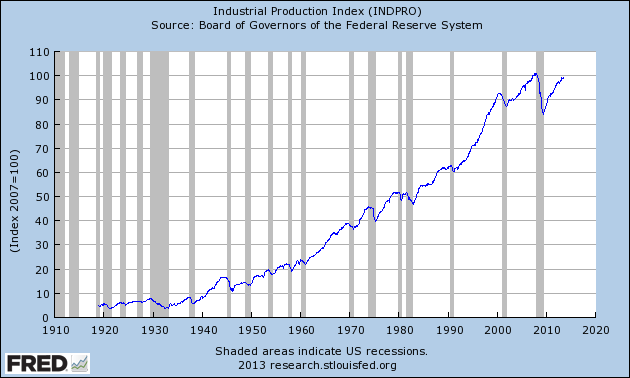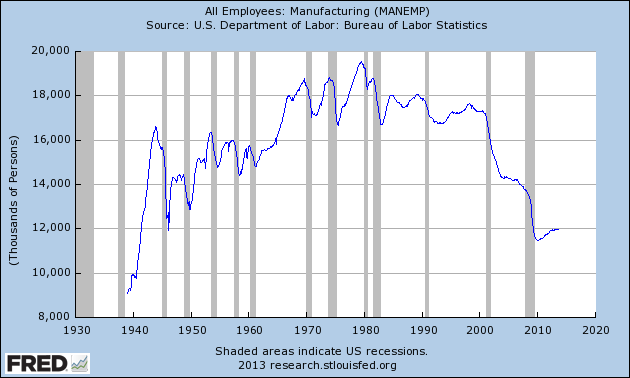According to a recent study at Oxford University, nearly half of U.S. jobs are at risk of computerization. 45% of America’s occupations will be automated away over the next two decades.
That sounds scary, and my bet is that it proves to be true.
But it’s also nothing new. Technology has been making jobs obsolete since the dawn of civilization. Ever since the first farmer got the bright idea to hitch his plow to an ox and make a team of farm hands obsolete, homo economicus has been destroying labor. The rate of change went parabolic during the Industrial Revolution, and we’re seeing the same kind of upheaval today, during the Information Revolution. But there is nothing new under the sun here. Technology destroys jobs. It also creates new ones and raises our inflation-adjusted incomes.
Here’s a little stat that will probably blow your mind: the United States manufactures more today than it did in the 1970s.
Yes, you read that correctly. I said “more.” As in a lot more.
Take a look at Figure 1, which tracks U.S. industrial production, adjusted for inflation. You can see a massive dip during the 2008-2009 financial meltdown and recession, but the picture here is clear. The United States manufactures more today than at any time in its history and two-and-a-half times more than in 1970 — the supposed heyday of American heavy industry before globalization and cheap foreign labor “hollowed it out.”
There is a hollowing out, of course. But it’s not in manufacturing, per se. It’s in manufacturing employment. Take a look at Figure 2. Since 1978, manufacturing employment has declined by about 40%. Over the same period of time, the U.S. population has grown by about 40%. As a percentage of a much larger workforce, the percent of U.S. workers in manufacturing has declined by more than half.
Without getting lost in the statistics, let’s state the obvious: technology made us more productive. We are now able to produce more with the same resources and to do it all far more cheaply.
And what was the result of all this? Did unemployment go through the roof as robots replaced workers?
Not exactly.
Up until the Great Recession forced unemployment to multi-decade highs, unemployment had been steadily trickling down since the early 1980s. The “real unemployment rate,” as some have taken to calling the U6 rate, which includes those working part time for lack of better options as unemployed, was also trending downward up until the 2008 meltdown took a wrecking ball to the employment picture.
Economics as a profession tends to focus a little too heavily on heavy industrial jobs. Perhaps this is because the profession came of age during the Industrial Revolution, or maybe it’s because industrial data is easier to quantify than services and information data. But the same forces at work are reshaping the employment picture here as well.
Consider the travel industry. Travel agencies used to be the medium through which you booked your flight and hotel. Today, those fuctions are handled by websites like Priceline (PCLN) or Orbitz (OWW). Agents have been replaced by software or relegated to consierge roles.
And even the economics of website building are changing. Building a site these days generally consists of taking a pre-built WordPress theme and customizing it. This leverages a talented software engineer’s time — a quality theme can be used to build an infinite number of sites — with the end result that the time and cost to set up a new site are a fraction of what they once were.
Perhaps it’s easy for me to speak about this dispassionately; after all, finance has been largely immune from this creative destruction, right?
Not quite. The widespread availability of stock screeners, charting software, and databases have massively cut back the man-hours needed to do basic investment research. This frees up more time for interpretation and writing, but it also means less need for entry-level analyst work.
All of this raises a very important question: if technology is shaving back the need for labor everywhere, then where will the jobs of tomorrow come from?
I have no idea. But if the past 200 years of history have taught us anything, the jobs will come, particularly for those motivated and with a solid education.
The general — and not all that helpful — advice to making your career future-proof is to learn skills that are not easily automated. That’s easier said than done, of course, but as a general rule the more educated you are the better the likelihood is that you will be a deployer of technology rather than one of its victims.
Charles Lewis Sizemore, CFA, is the editor of the Sizemore Investment Letter and the chief investment officer of investments firm Sizemore Capital Management. As of this writing, he had no position in any security mentioned.
- English (UK)
- English (India)
- English (Canada)
- English (Australia)
- English (South Africa)
- English (Philippines)
- English (Nigeria)
- Deutsch
- Español (España)
- Español (México)
- Français
- Italiano
- Nederlands
- Português (Portugal)
- Polski
- Português (Brasil)
- Русский
- Türkçe
- العربية
- Ελληνικά
- Svenska
- Suomi
- עברית
- 日本語
- 한국어
- 简体中文
- 繁體中文
- Bahasa Indonesia
- Bahasa Melayu
- ไทย
- Tiếng Việt
- हिंदी
Will Technology Make Us All Jobless?
Published 10/09/2013, 12:54 AM
Updated 07/09/2023, 06:31 AM
Will Technology Make Us All Jobless?
Latest comments
Loading next article…
Install Our App
Risk Disclosure: Trading in financial instruments and/or cryptocurrencies involves high risks including the risk of losing some, or all, of your investment amount, and may not be suitable for all investors. Prices of cryptocurrencies are extremely volatile and may be affected by external factors such as financial, regulatory or political events. Trading on margin increases the financial risks.
Before deciding to trade in financial instrument or cryptocurrencies you should be fully informed of the risks and costs associated with trading the financial markets, carefully consider your investment objectives, level of experience, and risk appetite, and seek professional advice where needed.
Fusion Media would like to remind you that the data contained in this website is not necessarily real-time nor accurate. The data and prices on the website are not necessarily provided by any market or exchange, but may be provided by market makers, and so prices may not be accurate and may differ from the actual price at any given market, meaning prices are indicative and not appropriate for trading purposes. Fusion Media and any provider of the data contained in this website will not accept liability for any loss or damage as a result of your trading, or your reliance on the information contained within this website.
It is prohibited to use, store, reproduce, display, modify, transmit or distribute the data contained in this website without the explicit prior written permission of Fusion Media and/or the data provider. All intellectual property rights are reserved by the providers and/or the exchange providing the data contained in this website.
Fusion Media may be compensated by the advertisers that appear on the website, based on your interaction with the advertisements or advertisers.
Before deciding to trade in financial instrument or cryptocurrencies you should be fully informed of the risks and costs associated with trading the financial markets, carefully consider your investment objectives, level of experience, and risk appetite, and seek professional advice where needed.
Fusion Media would like to remind you that the data contained in this website is not necessarily real-time nor accurate. The data and prices on the website are not necessarily provided by any market or exchange, but may be provided by market makers, and so prices may not be accurate and may differ from the actual price at any given market, meaning prices are indicative and not appropriate for trading purposes. Fusion Media and any provider of the data contained in this website will not accept liability for any loss or damage as a result of your trading, or your reliance on the information contained within this website.
It is prohibited to use, store, reproduce, display, modify, transmit or distribute the data contained in this website without the explicit prior written permission of Fusion Media and/or the data provider. All intellectual property rights are reserved by the providers and/or the exchange providing the data contained in this website.
Fusion Media may be compensated by the advertisers that appear on the website, based on your interaction with the advertisements or advertisers.
© 2007-2025 - Fusion Media Limited. All Rights Reserved.
